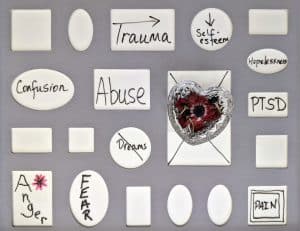

ADHD is a condition that is not usually present alone. People with ADHD have approximately a 50% chance of having another associated psychiatric condition or comorbidity.
Symptoms in adult ADHD can seem confusing, not only because they are different from those classically associated with ADHD, but also because they overlap with symptoms of other comorbid disorders. That is why it is so important to know the conditions most frequently associated with adult ADHD and their symptoms.
1. Depressive disorder

About 19% of adults with ADHD have the depressive disorder as comorbidity. It is a mood disorder characterized by the presence of symptoms such as:
- Decreased or increased appetite
- Irritability or sadness
- Loss of the ability to enjoy things that used to be pleasurable
- Sleep disturbances, such as sleeping too little or too much
- Ideas of guilt
- Hopelessness
- Difficulty in focusing
- Neglect of cleanliness and personal grooming
The symptoms must be present most of the day, every day, or for at least two weeks.
2. Dysthymia
Dysthymia is present in approximately 12% of adults with ADHD (versus 2% in adults without ADHD). It is a condition characterized by a persistent sad mood lasting at least two years.
3. Bipolar disorder
This mood disorder occurs in about 19% of adults with ADHD and is characterized by alternating periods of mania and hypomania, and periods of depression. The mood changes are not explained by the events in the patient’s environment; their duration varies from person to person.
In some cases of bipolar disorder, the patient never experiences episodes of extremely elevated mood (mania) but only episodes of sadness (depression).
4. Anxiety disorders

Adults with ADHD have approximately a 47% chance of developing anxiety disorders, compared to 19% of adults without ADHD. These are the most common anxiety disorders:
- Phobias: They are characterized by the avoidance of phobic situations or objects for fear of the consequences of exposure. The fear is irrational and affects the patient’s functionality. The person may experience tachycardia, sweating, rapid breathing, and a stomachache in the presence of a phobic situation or object (e.g., social gatherings, spiders).
- Post-traumatic stress disorder (PTSD): It is a disorder triggered by the occurrence of a catastrophic event in the patient’s life. PTSD is characterized by the appearance of flashbacks of the event, nightmares, and the avoidance of anything that reminds the patient of the traumatic event. Some people may experience feelings of being out of themselves (depersonalization) or not recognizing one’s environment (derealization).
5. Obsessive-compulsive disorder (OCD)
Obsessive-compulsive disorder is characterized by the presence of unpleasant thoughts (obsessions) accompanied by repetitive acts (compulsions) aimed at relieving anxiety. This condition is present in about 2.7% of adults with ADHD.
6. Substance abuse disorders

About 15% of adults with ADHD have substance abuse problems. Sometimes the use and abuse of substances are a consequence of the patient’s attempt to calm the anxiety related to ADHD. In other cases, they are a consequence of the patient’s difficulty in dealing with the frustration and burden of ADHD. Substance abuse disorders are comorbidity that can be prevented through an early therapeutic approach to the patient with ADHD.
7. Intermittent explosive disorder (IED)
Almost 20% of adults with ADHD have the intermittent explosive disorder as comorbidity. IED is usually established after the onset of the ADHD symptoms. It is characterized by bouts of intense rage or hostility accompanied by verbally or physically aggressive behavior.
Detecting the comorbidities associated with ADHD allows for establishing an ideal treatment, reducing the burden that these conditions entail, and minimizing the future impact on the patients’ lives and their families.
If you suspect that you or a loved one may have any of these ADHD-associated comorbidities, contact a mental health professional for proper evaluation, diagnosis, and treatment.
Edited by: Sarah “Sally” Creekmore, PA-C
Animo Sano Psychiatry is open for patients in North Carolina and Georgia. If you’d like to schedule an appointment, please contact us.
Other Blog Posts in
Animo Sano Psychiatry is open for patients in North Carolina, Georgia and Tennessee. If you’d like to schedule an appointment, please contact us.
Get Access to Behavioral Health Care
Let’s take your first step towards. Press the button to get started. We’ll be back to you as soon as possible.ecovery, together.




